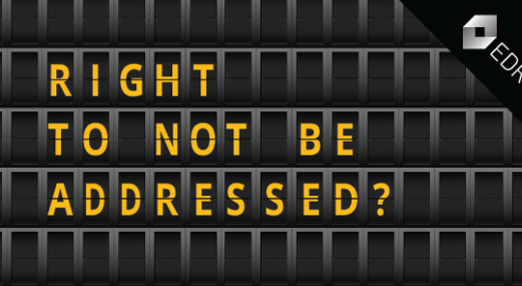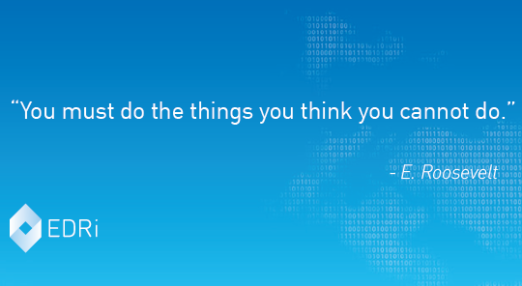Our work
EDRi is the biggest European network defending rights and freedoms online. We work to to challenge private and state actors who abuse their power to control or manipulate the public. We do so by advocating for robust and enforced laws, informing and mobilising people, promoting a healthy and accountable technology market, and building a movement of organisations and individuals committed to digital rights and freedoms in a connected world.
Filter resources
-

UN Security Council mandates worldwide air traveller profiling
In the name of “preventing, detecting and investigating terrorist offenses and related travel”, all United Nations (UN) Member States should develop systems for processing and analysing Passenger Name Record (PNR), Advance Passenger Information (API) and “fingerprints, photographs, facial recognition, and other relevant identifying biometric data”, according to a UN Security Council resolution (no. 2396) on […]
Read more
-

ENDitorial: Living as if being at an airport
The internet is starting to look more and more like an airport. Not only because of the ubiquitous surveillance, but also in the way that advertising is trying to steal our attention. Should we start working on a right to not be addressed?
Read more
-

Romania: Culture Ministry rallies copyright lobbyists
On 17 January 2018, the Romanian Ministry of Culture organised a debate on the EU copyright reform proposal. With the room full with about fifty participants, three quarters were representing press publishers, record labels and collective management associations. It seemed almost like a full-fledged campaign meeting organised for and by traditional newspapers and rightsholders organisations […]
Read more
-

Press release: 6th annual Privacy Camp takes place on 23 January 2018
Tomorrow, on 23 January 2018, Privacy Camp brings together civil society, policy-makers and academia to discuss problems for human rights in the digital environment. In the face of what some have noted as a “shrinking civic space” for collective action, the event provides a platform for experts from across these domains to discuss and develop […]
Read more
-

ePrivacy proposal undermined by EU Member States
The discussions on the ePrivacy Regulation continue in the European Union (EU) legislative process. They were on hold for a few weeks because of ongoing negotiations on the European Electronic Communications Code (EECC) – another big “telecoms” file that the Council of the European Union is working on.
Read more
-

EU-Japan trade agreement not compatible with EU data protection
The EU and Japan have announced the conclusion of the final discussions on a trade agreement, the EU-Japan Economic Partnership Agreement (EPA). Regarding cross-border data flows and data protection, the European Commission’s press release states that recent reforms of their respective privacy legislation offer new opportunities to facilitate data exchanges, including through a simultaneous finding […]
Read more
-

2018: Important consultations for your Digital Rights!
Public consultations are an opportunity to influence the future legislation at an early stage, in the European Union and beyond. They are your opportunity to help to shape a brighter future for digital rights, such as your right to an open internet, a private life, and data protection, or your freedom of opinion and expression.
Read more
-

Copyright reform: State of play
In 2016, the European Commission (EC) launched its proposal for a new Directive on Copyright in the Digital Single Market. This reform was supposed to update the previous Directive, to adapt it to the digital world. Since the previous Directive was adopted in 2001 (after a four-year legislative process), technology and the online ecosystem have […]
Read more
-

Commission claims that general monitoring is not general monitoring
Will everything we do on the internet be monitored and checked against by a non-transparent mechanism that decides what can be published? It is a real threat, and currently it is coming from an area that patently does not require such draconian measures: EU copyright law. This threat is a peculiar one, because there are […]
Read more
-

Proposal to revoke data retention filed with the Czech Court
On 20 December 2017, EDRi member Iuridicum Remedium (IuRe) filed a request with the Constitutional Court of the Czech Republic to revoke the Czech data retention related legislation.
Read more
-

2017: From EDRi to the world
2017 was a busy year for digital rights defenders. To advance our mission to defend and promote your rights to privacy, data protection, and freedom of information, expression and opinion, we worked hard to engage with European level decision-making, but also did our best to get out of the Brussels “EU bubble” and enhance digital […]
Read more
-

EU Parliament criticises incompetent Commission work on child abuse
The European Commission proposed its badly drafted “Directive on combating sexual abuse, sexual exploitation of children and child pornography” in 2010. In 2011, it was finally adopted by the Council of the European Union and the European Parliament.
Read more
